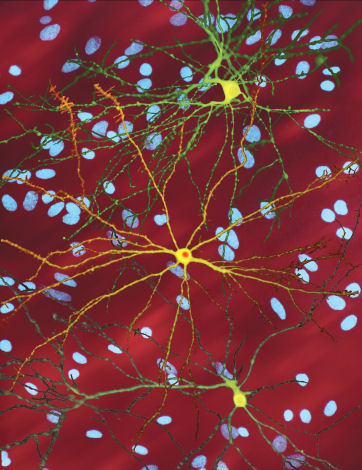Huntington's disease is a degenerative disease of the nervous system that sets in when a person is in their 30s or 40s, although they show no signs of the disease before it kicks in. Over a decade ago, researchers discovered that sufferers all have a fault in a specific gene, which makes a protein called huntingtin.
 But why are faults in this protein not harmful when sufferers are young, but has serious effects when they hit later life? That's what researchers at the University of Illinois wanted to answer. And in a new paper published in the journal Nature Neuroscience this week, the team, led by Scott Brady, may have discovered how huntingtin wreaks its havoc on the nervous system.
But why are faults in this protein not harmful when sufferers are young, but has serious effects when they hit later life? That's what researchers at the University of Illinois wanted to answer. And in a new paper published in the journal Nature Neuroscience this week, the team, led by Scott Brady, may have discovered how huntingtin wreaks its havoc on the nervous system.
The scientists discovered that the faulty version of huntingtin, found in patients, switches on an enzyme called JNK3, which is only switched on in nerve cells. At low levels of huntingtin, this activation of JNK3 blocks transport within nerve cells, stopping nerve cells from shuttling proteins from the middle of the cell along long fibres called axons.
This is bad news for nerves, as it means signals don't get properly transmitted down the nerve fibres, which causes the nerves cells to eventually die off, causing the problems of Huntington's disease.
The scientists think that activating JNK3 cuts down on transport in the nerve cells, but doesn't completely stop it. When nerve cells are young, they can cope with a reduction in transport. But as a person gets older - and their nerve cells get older - the cells become less able to cope.
The researchers think that this pattern of progressive nerve breakdown could also play a part in diseases like Alzheimer's, and other adult-onset neurodegenerative diseases. In fact, the scientists have coined the term 'dysferopathy' to describe these kinds of diseases - the word is from the Greek 'fero', meaning transport. So perhaps by targeting this "Achilles heel" of transport within nerve cells, we might be able to find new ways to prevent or treat these kinds of disorders in the future.
- Previous Plants take a leaf out of insects' books
- Next Pot Dating










Comments
Add a comment